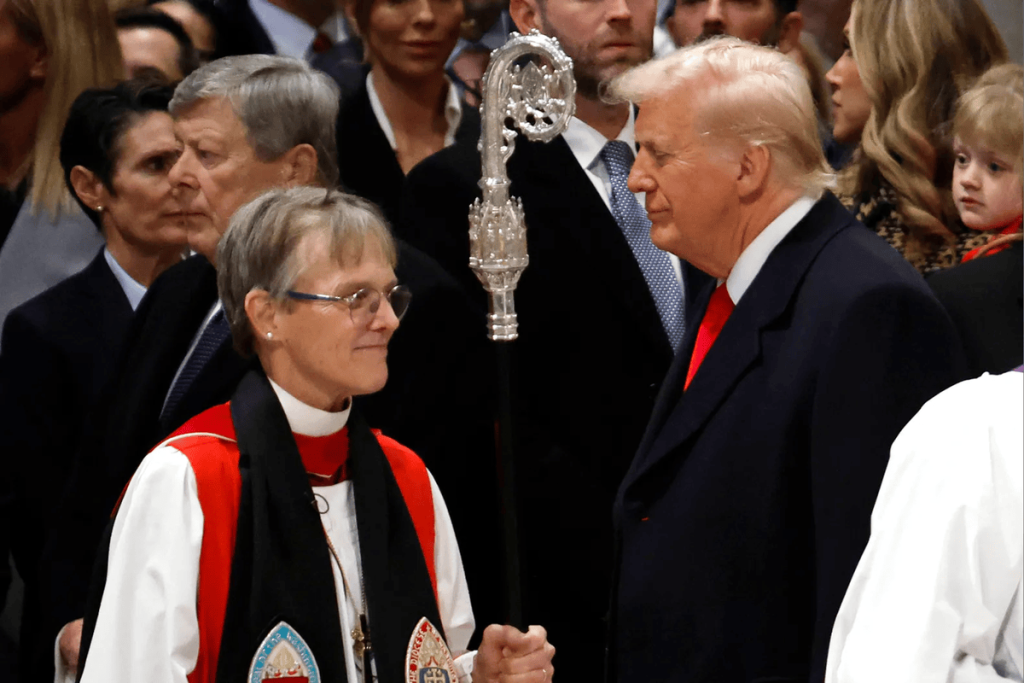Bishop Mariann Edgar Budde, a prominent faith leader and the first woman to lead the Episcopal Diocese of Washington, delivered a sermon at the National Cathedral’s National Prayer Service. Her direct appeal to President Donald Trump for compassion toward marginalized groups, including immigrants and LGBTQ+ individuals, has sparked widespread discussion about the role of faith in addressing societal issues.
Who Is Bishop Mariann Edgar Budde?
Bishop Mariann Edgar Budde serves as the Episcopal Diocese of Washington’s first female leader, a role she has held since 2011. Over the years, she has been a prominent advocate for social justice, often addressing issues such as LGBTQ+ rights, immigration, and racial equality from the pulpit.

A native of New Jersey and Colorado, Budde studied at the University of Rochester and served as rector of St. John’s Episcopal Church in Minneapolis for nearly two decades before her current position. Known for her humility and commitment to her community, she is a familiar figure in Washington, often seen biking around the city.
Budde oversees the National Cathedral, a cornerstone of American faith and a venue for national moments of unity. Her leadership reflects her dedication to addressing moral and ethical issues with compassion and courage.
Mariann Budde’s Sermon Plea For Mercy
The National Prayer Service, a tradition dating back to the 1933 inauguration of Franklin D. Roosevelt, serves as a moment of reflection and unity. This year’s event, held the day after Donald Trump’s inauguration, was no different. However, Bishop Budde’s sermon took on a pathetic tone as she directly addressed the president.
“In the name of God, I ask you to have mercy upon the people in our country who are scared now,” Budde plea, turning her gaze toward Trump. She highlighted the fears of LGBTQ+ individuals and immigrant families, many of whom feel threatened by the president’s policies and rhetoric, as they should.
Budde’s plea came just a day after Trump announced a series of executive orders targeting immigration and gender identity. These included measures to end birthright citizenship and reinforce a binary definition of gender, sparking widespread concern among marginalized groups.
In her 15-minute address, Bishop Budde outlined three pillars for national unity: honesty, humility, and the recognition of human dignity. She implored Trump to consider the lives of those impacted by his policies, stating, “There are gay, lesbian, and transgender children in Democratic, Republican, and independent families, some who fear for their lives.”
She continued by addressing the contributions of immigrants to the nation, saying, “The people who pick our crops, clean our office buildings, and work the night shifts in hospitals may not have proper documentation, but they pay taxes and are good neighbors.”
The sermon closed with a poignant reminder: “Without unity, we are building our nation’s house on sand.”
Trump’s Reaction Said It All
President Trump was visibly unmoved by the service, later telling reporters that it “was not too exciting” and that the organizers “could do much better.” Despite his criticism, Bishop Budde’s words struck a chord with many, sparking widespread discussion online and among faith communities.
Republican Representative Mike Collins of Georgia shared a clip of the sermon on X (formerly Twitter), suggesting that Budde “should be added to the deportation list.” This reaction underscores the divisive nature of her message in today’s polarized political climate.
Bishop Budde’s Past Criticisms Towards Trump
This isn’t the first time Bishop Budde has challenged Trump. In 2020, she publicly condemned his use of St. John’s Episcopal Church and the Bible as props after law enforcement cleared racial justice protesters using chemical agents. Budde called the act “outrageous” and a misuse of sacred symbols.
Her consistent advocacy for justice and equality has earned her both admiration and criticism. However, her role as a spiritual leader is to uphold the values of compassion and mercy central to her faith, not to be an activist pushing their agenda.


